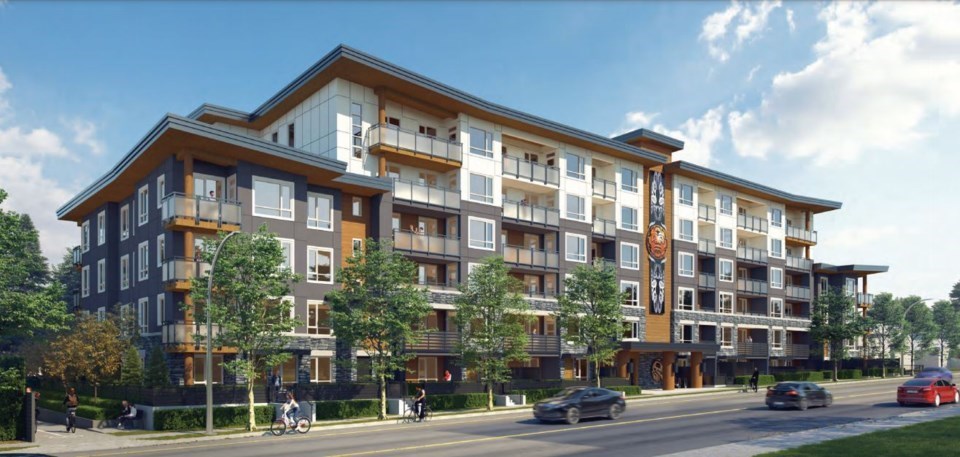Site preparation will soon be getting underway on a 96-unit affordable housing development for Black and Indigenous families, elders and individuals in New Westminster.
Representatives from the provincial government, the Lu'ma Native Housing Society, the Swahili Vision International Association and the City of New Westminster gathered online Feb. 11 to celebrate the rental project that’s being built at 823 to 841 Sixth St.
“Site preparation will be starting soon, with construction scheduled to begin this summer,” said New Westminster MLA Jennifer Whiteside.
Whiteside said the project will provide 96 affordable rental homes for members of the Indigenous and Swahili-speaking communities.
“New Westminster, like all communities across British Columbia, needs an influx of housing supply,” she said. “We know that demand for housing continues to increase. Thousands of people are moving to our beautiful province each year. Between 2015 and 2021 New Westminster had the third-highest rate of growth in Metro Vancouver. And New West is now second only to Vancouver among the most densely populated urban areas in Canada, surpassing cities like Toronto and Montreal.”
According to a press release from the province, the rental housing project was first brought forward to BC Housing through a partnership between the Swahili Vision International Association and the Aboriginal Land Trust. The development will be operated by Lu'ma Native Housing Society and the Swahili Vision International Association, and the Aboriginal Housing Management Association will provide operational oversight.
Kent Patenaude, president of the Lu'ma Native Housing Society, said the ever-increasing cost of rental units, together with an extremely low vacancy rates, has resulted in hardships for low-income families seeking quality housing in the Lower Mainland.
“This is become increasingly prevalent in the City of New Westminster, and the issue is not isolated to the Indigenous community. Lu'ma is extremely proud to partner with the Swahili Vision Society and assist with their members’ housing needs,” he said. “We are honoured to be part of such an innovative partnership with the Swahili community and look forward to selecting a project name with our new partner and the sharing of cultures and experiences.”
Construction is anticipated to begin this summer and the project is expected to be complete in early 2024.
"This development represents a unique collaboration of two historically marginalized segments of society with similar rich, vibrant, and resilient cultures,” Patenaude said. “We believe this unique model of housing will build capacity and inspire other new innovative partnerships, ensuring access to safe, affordable and culturally appropriate housing."
It takes a village
Jean-Claude Bakundukize, co-founder of the Swahili Vision International Association, said his organization supports people from East African and Swahili-speaking communities who are facing challenges when they come to Canada.
“We are seeing a lot of families coming here and really struggle, struggle to find a place to live,” he said.
Bakundukize said his association felt “blessed” to be contacted about becoming involved in the project.
"As we say in Africa, 'It takes a village to raise a child,' and children are the future and backbone of a community," he said. "We are witnessing the beginning of a village, the likes of which has never been seen before. Indigenous Peoples living, sharing, caring and enjoying everyday life together with Swahili people; two peoples, two cultures fusing together, to raise their children together, to learn off each other and enhance one another in a modern village setting, and the beginning of a housing solution to some of our marginalized communities."
The building will include a combination of one-, two- and three-bedroom apartments, and a ground-floor amenity room with a full kitchen, washroom and storage room. Exterior features will include a large outdoor terrace with a dining area, seating and barbecue hookups, multi-use exercise space and a children's play area.
Mayor Jonathan Cote said affordable housing is a critical issue in New Westminster, Metro Vancouver and British Columbia, so the city is grateful for the support of the provincial.
“I think that’s what makes this project so important and so special,” he said. “I am really looking forward to the day when this finally opens its doors and new community members are moving in. New Westminster is an incredibly diverse community, and I know we are going to open with open hearts our new neighbours in this important project. Indigenous and Swahili individuals and families are going to find a wonderful home in New Westminster and in this community. “
Rachna Singh, parliamentary secretary for anti-racism initiatives, said the province has met with met with Black and Indigenous communities over the last year and has heard that affordable, culturally safe housing is an ongoing need.
"New Westminster is one of the most densely populated urban centres in Canada, with a well-established and growing Black community. As we celebrate Black History Month, this project highlights our commitment to deliver lasting change for Black and Indigenous communities,” she said in a news release. “It's an important step forward to reduce barriers and ensure that stability and critical supports are available to families."
In May 2021, New Westminster city council unanimously supported a zoning amendment and an official community plan amendment that allows the project to proceed. Council’s support for the affordable housing project came after a four-and-a-half-hour virtual public hearing that included more than 70 speakers.
Supporters said the project would be provide affordable housing, support work on truth and reconciliation and create housing for community members who have the greatest need. While supporters said the site is an appropriate location for the apartment because it’s on a main street and is near transit, schools and other amenities, the vast majority of people who opposed the project expressed concern about building a six-storey building next to single-family homes.
Follow Theresa McManus on Twitter @TheresaMcManus
Email [email protected]

